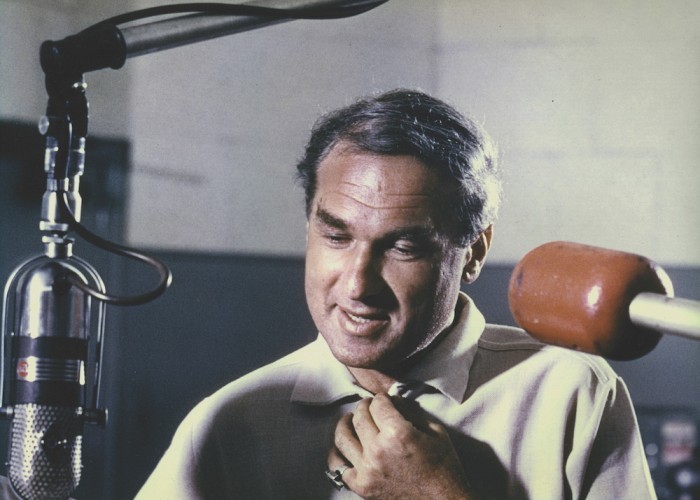Dec 9, 2025 12:28 PM
In Memoriam: Gordon Goodwin, 1954–2025
Gordon Goodwin, an award-winning saxophonist, pianist, bandleader, composer and arranger, died Dec. 8 in Los Angeles.…

Norman Granz (1918–2001)
(Photo: The Estate of Oscar Peterson)The history of jazz offers a select group of rebels who profoundly bent its fortunes without ever playing a note of music. One of these lone wolves was Norman Granz (1918–2001), who parleyed his own rarified tastes and an indifference to industry norms into a vertically integrated jazz empire. By gathering everything under one thumb—his own—he created, managed and marketed his own visions of what the record industry could achieve.
Today, the eldest surviving child of that empire is Verve Records, since 1998 a unit of Universal Music. And the label is celebrating the centennial of Granz’s birth with a four-CD set featuring artists with whom he worked, including Louis Armstrong, Count Basie, Ella Fitzgerald and Oscar Peterson. Norman Granz: The Founder was programmed by Granz biographer Tad Hershorn, whose lively liner notes also provide the narration.
“Even with all our labels today at Universal, Verve is still the one we use as our jazz brand,” said Ken Druker, vice president for jazz development at Verve Label Group. “We hope this [box set] sells. It’s an important part of our history. But it’s not, as we say, a ‘revenue play.’”
Danny Bennett, president/CEO of Verve Label Group, added: “Norman Granz’s dedication to equality and social justice—for his artists and his audiences—was extraordinary in his time and is still relevant today. Every day we at Verve operate in the pioneering spirit of Norman Granz.”
There is some irony in the notion of an enormous music corporation celebrating a man who likely wouldn’t rise within its ranks today. Hostile to intrusion and indifferent to the marketplace, Granz relished his sovereignty. For him, nothing mattered but doing it his way. As a producer, though, his touch was light.
Granz began his impresario days in 1942 organizing off-night jam sessions in Los Angeles clubs. In 1944, he had an epiphany: If a jam could draw 200 in a club, why not 2,000 in L.A. Philharmonic Auditorium? “Jazz at the Philharmonic,” he thought, had a nice ring to it, and the debut concert in July was recorded. As Granz listened days later, he was struck by how the concert’s excitement could be felt through the recording and saw a new dimension in commercial recording: music as documentary. It would be the great innovation of his career. Granz took the Philharmonic recordings to executive Manie Sacks at Columbia, “but Sacks couldn’t see the possibilities,” Granz later said. So, the chance to issue the first live concert records in 1945 fell to an obscure label owned by Moses Asch.
The “Jazz at the Philharmonic” concept caught fire, fueled by the push-pull of concerts and records promoting each other. “For the first 10 years,” Granz said in 1997, “the concerts subsidized the record company. Every artist didn’t necessarily carry his own weight.”
In 1956, Granz consolidated everything under a single brand, and Verve was born. Though spread across four discs, The Founder can’t hit all the bases. But it shines light into some less expected early corners, like a track by the Ralph Burns Orchestra with Lee Konitz. “We wanted it to be a good listen,” Druker said. “So, we kept the focus on the music flow.” DB

Goodwin was one of the most acclaimed, successful and influential jazz musicians of his generation.
Dec 9, 2025 12:28 PM
Gordon Goodwin, an award-winning saxophonist, pianist, bandleader, composer and arranger, died Dec. 8 in Los Angeles.…

Belá Fleck during an interview with Fredrika Whitfield on CNN.
Jan 13, 2026 2:09 PM
The fallout from the renaming of the John F. Kennedy Center for the Performing Arts to include President Donald…

The success of Oregon’s first album, 1971’s Music Of Another Present Era, allowed Towner to establish a solo career.
Jan 19, 2026 5:02 PM
Ralph Towner, a guitarist and composer who blended multiple genres, including jazz — and throughout them all remained…

Rico’s Anti-Microbial Instrument Swab
Jan 19, 2026 2:48 PM
With this year’s NAMM Show right around the corner, we can look forward to plenty of new and innovative instruments…

Dec 11, 2025 11:00 AM
DownBeat presents a complete list of the 4-, 4½- and 5-star albums from 2025 in one convenient package. It’s a great…